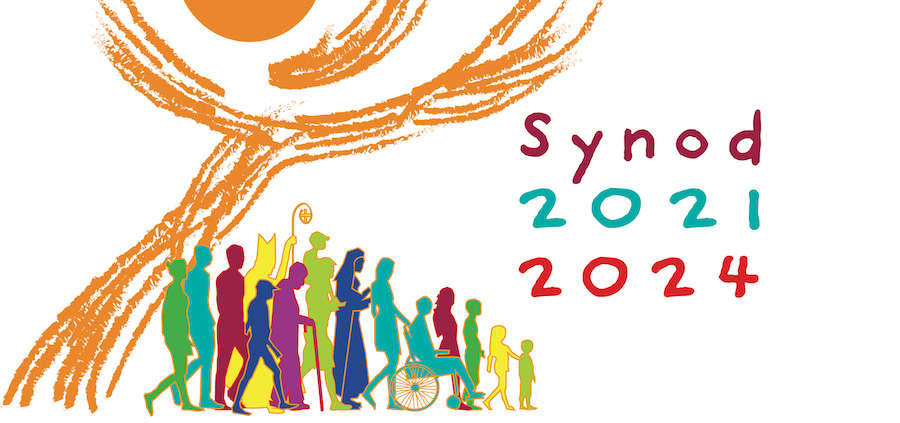A Coordination of Charisms: Synod Report for October 20, 2023
Archbishop Tarcisio Isao Kikuchi, SVD, of Tokyo, said that “local cultures and local realities should be respected when we talk about synodality” at a press briefing this morning.
Archbishop Kikuchi is the president of Caritas Internationalis, a confederation of 160 Catholic relief and social service organizations operating worldwide. His remarks came the day after participants in the Synod joined in a moment of prayer for migrants and refugees in St. Peter’s Square. Pope Francis presided over the service.
After a reading of the Parable of the Good Samaritan from the gospel of Luke (10:25-37), Francis described the parable as “the key to moving from a closed world to an open world, from a world at war to a world at peace.”
The parable “tells us that [the Samaritan] saw the wounded man and had compassion on him,” Francis said. “Compassion is the imprint of God in our hearts. Here is the key. Here is the turning point.”
Referencing the Samaritan’s sense of “long-term responsibility” to the wounded man, Francis continued, “The Good Samaritan is also concerned about returning. This is why it is important for us to be prepared adequately for the challenges of today’s migrations, understanding not only critical issues, but also the opportunities they offer, with a view to the growth of more inclusive, more beautiful and more peaceful societies.”
Joining Archbishop Kikuchi at today’s briefing were Archbishop Gintaras Grušas of Vilnius, Lithuania; Sr. Houda Fadoul, a Syrian Catholic nun of the Deir Mar Musa Monastery in Nabk, Syria; and Sr. Mary Theresa Barron, OLA, president of the International Union of Superiors General (UISG).
For Sr. Fadoul, the Synod is “a time of exchange” that “is very much for everyone in the church.”
“There is a starting point, there is a route to follow,” she said. “We are all members of the same body of Jesus.”
Archbishop Grušas said that the Continental Assembly of the Synod in Europe, held in Prague this past February, helped prepare him for the current Synod. After that five-day meeting, he said, “Everybody left with a very positive experience.”
The archbishop said that the 45 European countries represented at the Continental Assembly provided a “great variety of people and perspectives in [the] sharing debate.” The current Synod “is that type of sharing on a much large scale,” he said.
The archbishop also stressed the importance of “formation as a way of being church.” He explained that an ongoing “conversion of heart, conversion of our own minds” underlies formation, and that Synod delegates are not focused on a final document so much as “working through the process” of being formed in synodality.
Sr. Barron is a member of the Congregation of the Missionary Sisters of Our Lady of the Apostles. Picking up on a theme that was introduced yesterday by Archbishop Anton Dabula Mpako of South Africa, she spoke of how her experience with Small Christian Communities (SCCs) has informed her understanding of synodality.
Sr. Barron’s work as a missionary took her to East Africa, which she called “my first introduction to a synodal church.” She described a parish structure in her region that comprised 35 villages. Each village had an “outstation” with a catechist. There were only two priests to serve the entire parish, she explained.
“It was such a synodal process,” she said. “We listened to each other. The decisions were taken together. The outstation fed into the center, which fed into the parish, which then fed into the diocese.”
Sr. Barron said that the Synodal Assembly reminds her of the Sunday meetings of Small Christian Communities in East Africa, particularly the way that everyone is given a chance to contribute regardless of rank, position, or educational status.
“We shared our faith from the depths of our hearts and we came to a decision together,” she said. “Every voice was the same around that Basic Christian Community.”
Reports from the Synod working groups this morning continued to focus on section B.3 of the Instrumentum Laboris, “Participation, Governance, and Authority.” Dr. Paolo Ruffini of the Dicastery of Communications said that “co-responsibility” and “the coordination of all charisms” within the church have been noted in the reports, as well as the need to “avoid authoritarianism.”
“The bishop has the last word but not the only word,” he said.
The Synodal Assembly also discussed how clericalism has enabled abuse and “a loss of credibility to the church,” said Synod communications team member Sheila Pires. She said that “synodality can play a part in preventing abuses” by emphasizing listening and co-responsibility.
Pires also mentioned financial transparency and the importance of digital media as “a place of mission,” particularly to younger people, as subjects that have arisen in recent synodal conversations. ♦
Michael Centore
Editor, Today’s American Catholic




Leave a Reply
Want to join the discussion?Feel free to contribute!